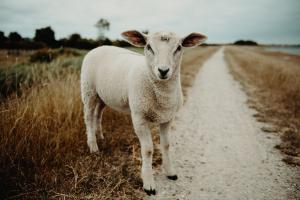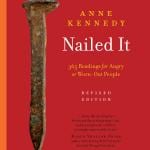I’m over at Stand Firm this morning…sorry to be so late!
Well, I shouldn’t have, but I couldn’t resist. Apparently, Mr. Cuomo is being given an award for his handling of the covid crisis here in New York—something having to do with movies or television or something. Can’t remember, nor was I curious enough to investigate why some part of the entertainment industrial complex would be giving an award to a public servant (or a politician, however you want to look at it). Of course, Mr. Cuomo has just written a book all about how clever and wonderful he is, and what a good job he has done, and so perhaps that is why he is being given this award. I don’t know, nor, as I said, do I care. I’m just here, as they say, for the ratio—and what a brilliant and wonderful ratio it is. The Entertainment Industrial Complex announced the conferment of this necessarily (because of its recipient) meaningless and foolish award, and the Entire World TM showed up to complain about it. When I clicked on this treat there was something like only 4000 likes and seventeen THOUSAND comments, 90% of them marvelously negative.
I do want to apologize. I don’t mean to be getting even a shade political about the coronavirus. But, as a child said to me this week in horror, “Wait…WAIT…do you mean that either Trump or Biden is going to be president? There are No Other Options?” “I know,” I said, “I’m sorry, yes, but also, where have you been kiddo?” In this new world, everything is political. Still, I hope it is not very controversial to suggest that Mr. Cuomo should not be giving himself a lovely tour of self-congratulation. Here is a long and very useful Twitter thread documenting what Mr. Cuomo did each day up until it became his express wish that residents of nursing homes should be returned to said homes with positive coronavirus tests leading to the deaths of thousands of those people which were—get this—undercounted because nursing home residents who died in the hospital of covid were not numbered in the same way that everyone else was.
Look, I don’t think this is a good time for anyone to be given any kind of award for any reason. When some kind of terrible thing happens, everyone behaves in one way or another—some of the time good, some of the time bad. The whole point of covid, from a Christian perspective, is that it lets all of us down here, wandering around in our own tiny myopic circles, see what God always sees from up there. Something like this is apocalyptic in the sense that it reveals what has always been there, but not all of us could see it. To make it personal, covid has revealed to me the deficits of my own character and spiritual life. This year I have discovered that I am angry a lot more than I thought, that I am quick in my bitterness against God, that I am not just sort of a funny critical person on my blog, but that I can be cruelly cutting in my criticisms of others (hopefully mostly quietly to myself). But I also discovered the degree to which I need the church—I have to go to church, one way or another. I require the body of Christ and my prayer life and my bible reading in a way that I did not know before this year. All of these lessons have been painful for me—though good, because to see is always better than not to see.
And that is Jesus’ very point when he lines up all the sheep and goats at the end of the time and shows them what he always knew—some of them loved him always and wanted to be with him, and some of them hated him and did not want to be with him no matter what happened.
Then he will answer them, saying, ‘Truly, I say to you, as you did not do it to one of the least of these, you did not do it to me.’ And these will go away into eternal punishment, but the righteous into eternal life…”
Jesus concludes at the end of this morning’s text. This, of course, is only a short time before his death, when all his interlocutors are so angry that they determine that he should die rather than that they should live. And, in the perfect and divine mercy of God, his death is the very means by which death itself is undone, and some of them are eventually welcomed into eternal life. Those dark hours on Friday are the apocalypse to which all other apocalypses nod and bend their heads. But in these tense moments before that ultimate moment, Jesus pulls back the veil and gathers up all the pictures of what this will look like in himself. All of Ezekiel’s cries about sheep and shepherd, all of David’s psalms, all of Jacob’s flocks, all the way back to the first moments with Abel took a lamb and sacrificed it, illuminating the deep angry hatred of Cain for God’s word—all of it is gathered up in Christ and by Christ.
And it’s such a simple revelation, though a heartbreaking one—that the people who love Jesus, without even knowing what they are doing, feed, clothe, and love the ones that he loves, the naked, the wounded, the hungry, the thirsty, the cast down, the helpless. The ones that God himself promises, in Ezekiel, to search out and find—“I will seek the lost, and I will bring back the strayed, and I will bind up the injured, and I will strengthen the weak…” Meanwhile, look at how confused and angry are those who did not even see that there were hungry and naked people anywhere around. They are also confused and say, “Lord, Lord,” in complete astonishment.
We must pause just one moment—as the distinction between sheep and goats is such an essential and far-reaching one—and say something about the confusion felt on all sides. The sheep were binding up the wounds of the downcast, but they had, and this is what Jesus is getting at, consideration and love for “the least of these,” which is a particular category in scripture. Jesus, at another point, pulling a young child to himself and pointing both to the disciples and to the little child, refers to his disciples as “the least of these,” thereby jumbling together his own disciples into the larger group of childlike “little ones” who are here called sheep. The disciples do not enjoy being lumped in among the small, the helpless, the powerless, the people who need help of many and all kinds. They protest. They want to be among the rich and powerful who will sit on the “right hand” of Jesus when he establishes his kingdom. They believe it will be a kingdom right then. Their disappointment, as the days increase, is an apocalypse of its own.
“The least of these” are always the sheep whom the Good Shepherd goes to find. They are not everybody. They are not all naked and hungry people in the world, for, indeed, many naked and hungry people persist in cursing God. But most of us, being, as we are, so limited in our vision, so blind to all that God is working out, do not know who is really naked, who is really hungry, who is really thirsty. This is one reason why Christians, historically, have been in the habit of going out and clothing all the naked, of feeding scores of people, of stopping by the side of the road, as Jesus mentioned another time, to pick up someone who had been left there to die, and taking him, and binding his wounds, and paying for his bed and board. Indeed, the sheep whom the Lord separates from the goats have been out in the highways and byways, so occupied in serving the downcast and wretched that they have not even stopped to think about it. They are as astonished as anyone. They were just doing the obvious thing, which turned out to be serving Christ himself. When they collapse into bed at night, they did not write up a self-congratulatory memoir and they did not receive an award, because no one cared what they were doing….read the rest here.













